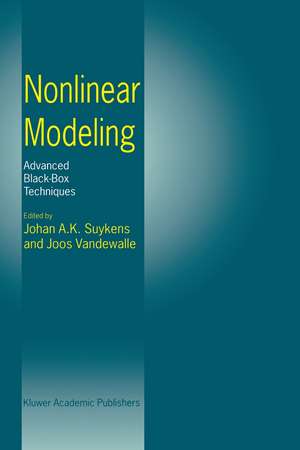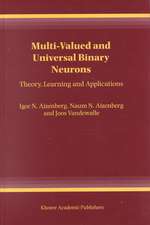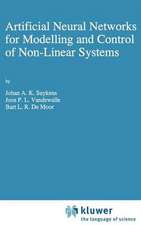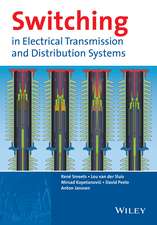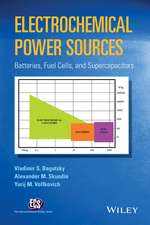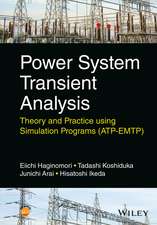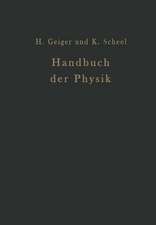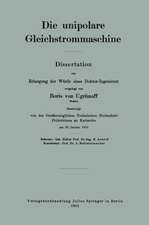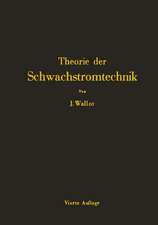Nonlinear Modeling: Advanced Black-Box Techniques
Editat de Johan A.K. Suykens, Joos P.L. Vandewalleen Limba Engleză Paperback – 5 noi 2012
- Neural nets and related model structures for nonlinear system identification;
- Enhanced multi-stream Kalman filter training for recurrent networks;
- The support vector method of function estimation;
- Parametric density estimation for the classification of acoustic feature vectors in speech recognition;
- Wavelet-based modeling of nonlinear systems;
- Nonlinear identification based on fuzzy models;
- Statistical learning in control and matrix theory;
- Nonlinear time-series analysis.
It also contains the results of the K.U. Leuven time series prediction competition, held within the framework of an international workshop at the K.U. Leuven, Belgium in July 1998.
| Toate formatele și edițiile | Preț | Express |
|---|---|---|
| Paperback (1) | 943.88 lei 6-8 săpt. | |
| Springer Us – 5 noi 2012 | 943.88 lei 6-8 săpt. | |
| Hardback (1) | 949.73 lei 6-8 săpt. | |
| Springer Us – 30 iun 1998 | 949.73 lei 6-8 săpt. |
Preț: 943.88 lei
Preț vechi: 1151.07 lei
-18% Nou
Puncte Express: 1416
Preț estimativ în valută:
180.61€ • 196.80$ • 152.19£
180.61€ • 196.80$ • 152.19£
Carte tipărită la comandă
Livrare economică 23 aprilie-07 mai
Preluare comenzi: 021 569.72.76
Specificații
ISBN-13: 9781461376118
ISBN-10: 1461376114
Pagini: 280
Ilustrații: XVII, 256 p.
Dimensiuni: 160 x 240 x 15 mm
Greutate: 0.4 kg
Ediția:Softcover reprint of the original 1st ed. 1998
Editura: Springer Us
Colecția Springer
Locul publicării:New York, NY, United States
ISBN-10: 1461376114
Pagini: 280
Ilustrații: XVII, 256 p.
Dimensiuni: 160 x 240 x 15 mm
Greutate: 0.4 kg
Ediția:Softcover reprint of the original 1st ed. 1998
Editura: Springer Us
Colecția Springer
Locul publicării:New York, NY, United States
Public țintă
ResearchCuprins
1 Neural Nets and Related Model Structures for Nonlinear System Identification.- 1.1 Introduction.- 1.2 Black-box Identification Approach.- 1.3 Fitting the Parameters.- 1.4 The Nonlinear Mapping.- 1.5 Some Standard Theory on Model Properties.- 1.6 Bias-Variance Trade-off.- 1.7 Discussion.- 1.8 Dynamic Systems.- 1.9 A stepwise Approach to Nonlinear Black-box Identification.- 1.10 Examples.- 1.11 Conclusions.- References.- 2 Enhanced Multi-Stream Kaiman Filter Training for Recurrent Networks.- 2.1 Introduction.- 2.2 Network Architecture and Execution.- 2.3 Gradient Calculation.- 2.4 EKF Multi-Stream Training.- 2.5 A Modeling Example.- 2.6 Alternating training of weights and initial states.- 2.7 Toward more coordinated training of weights and states-A Motivating Example.- 2.8 The Mackey-Glass Series.- 2.9 Use of a structured evolver.- 2.10 Summary.- References.- 3 The Support Vector Method of Function Estimation.- 3.1 Introduction.- 3.2 The Optimal Hyperplane.- 3.3 The Support Vector Machine for Pattern Recognition.- 3.4 Examples of SV Machines for Pattern Recognition.- 3.5 The SVM for regression estimation.- 3.6 Kernels for Estimating Real-Valued Functions.- 3.7 Solving Operator Equations.- 3.8 Conclusion.- References.- 4 Parametric Density Estimation for the Classification of Acoustic Feature Vectors in Speech Recognition.- 4.1 Introduction.- 4.2 The Probability Densities.- 4.3 Maximum Likelihood Estimation.- 4.4 Mixture Models.- 4.5 Numerical experiment.- 4.6 Conclusion.- References.- 5 Wavelet Based Modeling of Nonlinear Systems.- 5.1 Introduction.- 5.2 Wavelet Interpolation Method.- 5.3 Wavelet Interpolation in Sobolev Space.- 5.4 Numerical Examples.- 5.5 Conclusions.- Appendix: Constrained Minimal Norm Interpolation.- References.- 6 Nonlinear Identification based onFuzzy Models.- 6.1 Introduction.- 6.2 Functional fuzzy models.- 6.3 Fuzzy Modelling algorithms without structure determination.- 6.4 Structure determination.- 6.5 A worked example.- 6.6 Discussion.- References.- 7 Statistical Learning in Control and Matrix Theory.- 7.1 Introduction.- 7.2 Paradigm of Controller Synthesis Problem.- 7.3 Various Types of “Near” Minima.- 7.4 A General Approach to Randomized Algorithms.- 7.5 Some Sufficient Conditions for the UCEM Property.- 7.6 Robust Stabilization.- 7.7 Weighted H?Norm Minimization.- 7.8 Randomized Algorithms for Matrix Problems.- 7.9 Sample Complexity Issues.- 7.10 Conclusions.- References.- 8 Nonlinear Time-Series Analysis.- 8.1 Introduction.- 8.2 State space reconstruction.- 8.3 Influence of the reconstruction parameters.- 8.4 Noise reduction.- 8.5 Detecting nonlinearities.- 8.6 Modelling and prediction.- 8.7 Fractal dimensions.- 8.8 Lyapunov exponents.- 8.9 Synchronization of chaotic dynamics.- 8.10 Spatio-temporal time series.- References.- 9 The K.U.Leuven Time Series Prediction Competition.- 9.1 Introduction.- 9.2 Origin of the data.- 9.3 Results of the competition.- 9.4 Conclusions.- References.
